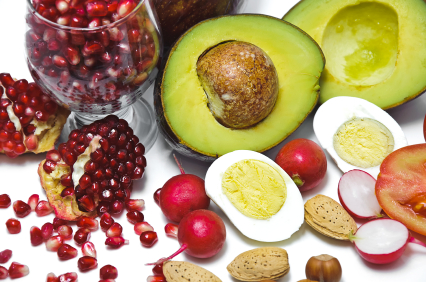 Drink water
Drink water
Water is critical to your health. It serves as the body’s delivery system, helping all the cells work well and talk to each other. Water carries the vitamins and minerals from food to the organs, cushions our bones and our joints, regulates body temperature, moistens the lungs and carries wastes out of body. While other drinks like juice and soda seem to do the same job as water, they are a poor substitute. In fact, they actually use up water in order to be digested! That means when you drink juice, soda or tea, you need to drink even more water to keep the right amount in your body.
 Eat breakfast
Eat breakfast
After fasting for several hours while you sleep, your body needs food in the morning to provide enough energy for the day. The best choices contain protein and fat, as they take more time for your body to digest, leaving you feeling full, focused and energized for longer. Good choices include eggs, bacon or sausage, and nut butters on toast.
 Eat in a relaxed state
Eat in a relaxed state
How you eat is almost more important than what you eat. Being in a relaxed state helps to properly digest the nutrients in your food. This can't happen if you are rushing around, watching TV, or working at the computer. When stress is on, digestion is off. With stress, heart rate and blood pressure increase, respiration quickens, and blood flow is routed away from the midsection. Before meals, teach your children to breathe slowly with their nose until their lungs are 2/3 filled, hold three seconds, and then exhale. Repeat three times. This will set up their digestive system up for success.
 Eat more whole foods
Eat more whole foods
Whole foods are foods that have not been processed or packaged. These include fruits, vegetables, poultry, meat, nuts, beans, dairy and eggs. They are high in nutrients that help improve your child’s health, intelligence and focus. Processed foods, like chips, crackers, cereals, cookies and even bread, are often devoid of nutrients and can stress your digestive system. Because they contain no nutritional value, eating them depletes the body of precious vitamins and minerals. Processed foods often contain chemical additives which are linked to aggression, inability to focus and hyper-activity.
 Embrace fat
Embrace fat
Fats are the building blocks of a healthy brain and nervous system, especially fats from natural sources such as butter, eggs, whole milk, coconut oil, raw nuts (not roasted), olive oil and avocados. A child needs to get these fats from his or her diet for optimal brain development. Manufactured fats such as trans-fats, partially‐hydrogenated oil and hydrogenated oil have been linked to a multitude of health problems including chronic pain, lowered resistance to bacteria and viruses, ADD, depression, and fatigue.
 Get some Vitamin D
Get some Vitamin D
Vitamin D is a fabulous supplement for boosting mood and health. While sunlight is the best way to get adequate Vitamin D, those who live at latitudes greater than 37 degrees (anyone north of San Francisco) don’t get enough vitamin D from the sun. Good food sources of vitamin D include oily fish, such as salmon, mackerel and tuna, free-range and grass-fed eggs and liver. Cod liver oil is also a rich source of vitamin D and a great supplement for kids of all ages.
 Avoid artificial sweeteners
Avoid artificial sweeteners
If you are going to indulge in a sweet treat, use real sugar, honey, maple syrup or stevia. All artificial sweeteners, including high fructose corn syrup, aspartame (sold as Equal and NutraSweet) and saccharine are hazardous to health. Aspartame is a known toxin that has been linked to hyperactivity in children as well as headaches, depression and anxiety attacks, and memory loss.
 Prioritize sleep
Prioritize sleep
Sleep is critical to good health. It gives your body the break it needs to rest and heal (and it also boosts the immune system, which is why sleep is so critical when you are sick). Kids need a minimum of 10 hours a day and can easily accrue a "sleep debt" that will eventually need to be repaid. For optimal sleep, try to avoid eating after 7 p.m., consuming alcohol or caffeine, television or other electronics before bed. It also helps to create a consistent nighttime routine and bed time.
 Pre-plan meals
Pre-plan meals
My mother used to go to the supermarket every day at 3 p.m. and wait for inspiration for dinner. I find that last minute strategy stressful and prefer to plan meals in advance (I like this meal planning sheet) before grocery shopping each week. I try to keep healthy snacks, like raw almonds, apples and string cheese on hand (and in the car) for when kids get hungry. I also make a double recipe of dinner to use for lunches or freeze for a homemade frozen meal on busy nights.
 Move your body
Move your body
Healthy bodies need to move. Even a 10- or 15-minute walk after lunch will improve your health greatly. Maybe go up and down the stairs at your office or walk around the block a few times. Aerobic breathing also increases your energy and removes stress.
Jodi Cohen is a Seattle-based Nutritional Therapist. She enjoys running, yoga, writing and time spent with her two young children. To learn more visit her at Vibrant Roots.









